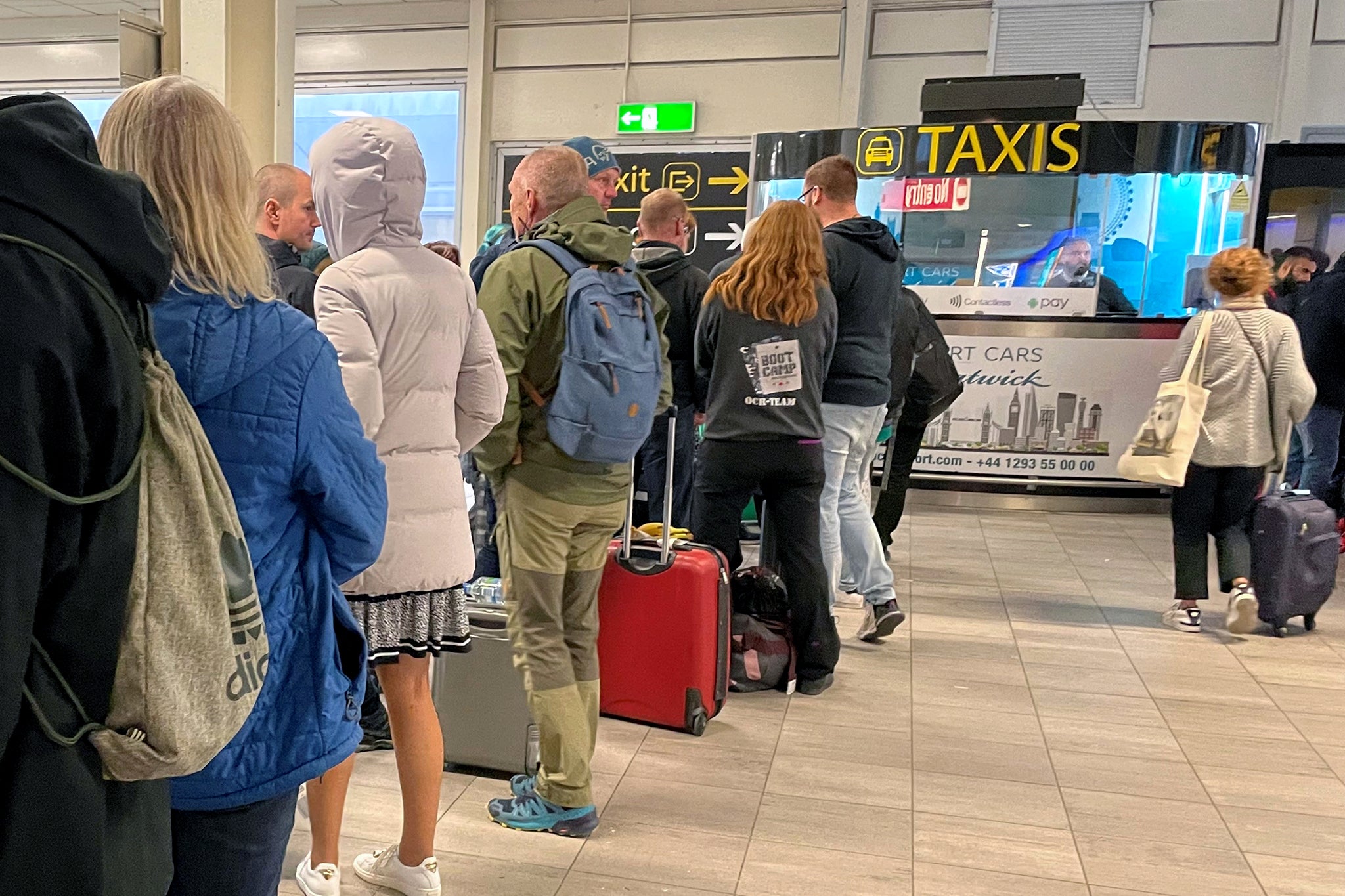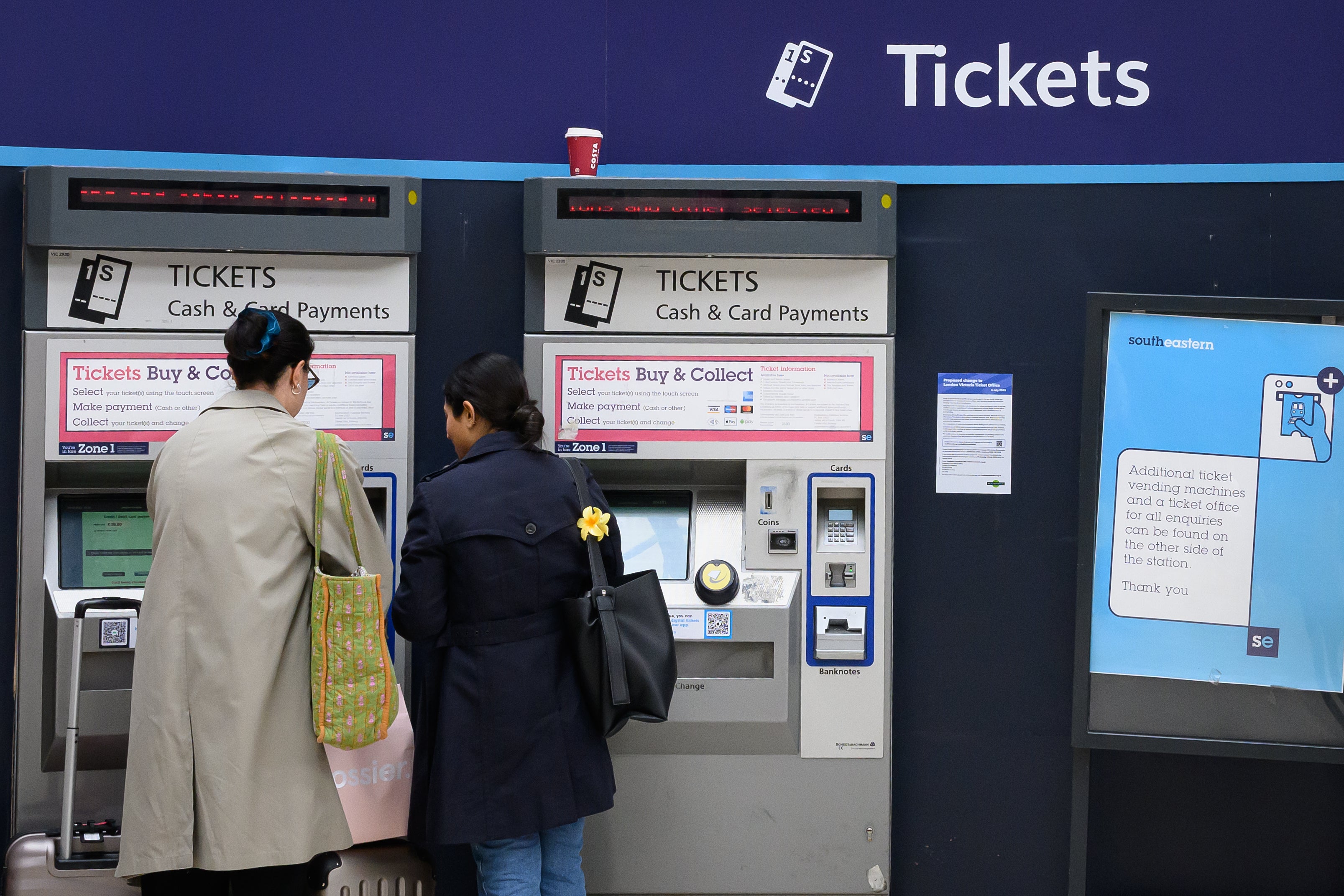I missed the last train – will easyJet pay for my taxi fare?
Simon Calder answers your questions on cabs, unwanted seats, and Scottish trains going ‘off-peak’ only


Q I got an easyJet flight from Montpellier to London Gatwick on Monday night last week. It was over an hour late and didn’t get in until after midnight – which meant I missed the last train and had to get an expensive Uber. Is there any way I can get any compensation from easyJet?
Mark M
A Bluntly, no. I see easyJet flight 8392 from the beautiful southern French city arrived 75 minutes behind schedule, at 12.30am. As has tended to happen this difficult summer, it appears that air traffic control delays built up during the day.
The Airbus began Monday morning with an on-time departure from Gatwick to Madrid, and returned on schedule, but in the afternoon it was late on a round trip to Nantes and back. The outbound flight to Montpellier left Gatwick over an hour late, and your inbound leg operated even further behind schedule.
Such delays are so common that I recommend everyone travelling on evening flights within Europe assumes a delay of at least an hour. If it turns out to be less than that, you should count it a success.
Along with every other airline, easyJet really wants to keep on schedule. I can almost guarantee that if you decided to get in touch anyway, the airline’s response would be along the lines of: “Beyond our control, take it up with your travel insurer.” I am also fairly sure that the insurance company, if you have one, would take the view that you did not allow enough resilience in your schedule to be sure of catching the last train, and politely decline any claim.
Talking of trains: for at least half a century, Gatwick airport has enjoyed through-the-night rail connections with central London, as well as with Brighton on the south coast. They are not particularly frequent. You were unlucky enough to miss the first two trains to London after midnight (at 12.01am and 12.42am). The next was over an hour later.
A long wait in the early hours at Gatwick has little appeal, particularly if you were expected at work on Tuesday morning. So all I can suggest is that you consider the Uber an expensive but worthwhile investment.

Q I have two seats booked on Ryanair from Birmingham to Perpignan on 28 September, returning on 1 October, which we can no longer take. I’m not looking for a refund – but how do we cancel them? I feel guilty that our seats will be empty. We definitely can’t fly, but changing the flights for a different time and/or destination costs about three times the original cost of the flight!
Skinny Jeans
A I agree. It seems ridiculous that well-meaning passengers who know they won’t be able to fly, and who understand Ryanair’s strict no-refund policy, can’t simply click a button saying: “Won’t be needing this flight, thanks” – allowing the airline to sell the seat again, and enabling someone else to travel.
Since it would appear to be in Ryanair’s interests to have more inventory to sell, you might imagine the airline would be eager to allow you to announce your non-appearance in advance. So why does this not happen?
There appear to be several issues. First, is the risk of accidental cancellation, when the traveller inadvertently clicks to annul the booking. I know of cases when this has happened on airlines that do allow online cancellation – as well as the occasional malicious incident when a third party has gained access to a booking and cancels it. An airline that does not allow cancellations will never have to get into the complexities of addressing such problems.
Next, while you understand the “no refunds” policy, others may not – again, adding potential complications in dealing with passengers who expect a refund. Ryanair definitely likes to keep things simple: unlike most carriers, it does not overbook its services. Anyway, in your case it looks unlikely that the flights will sell out: currently, Ryanair is selling the outbound leg for £61, and inbound for £61, indicating (to me at least) that it is awash with empty seats.
Finally, a plea to everyone who books a flight like yours: do not pay for extras until the last minute. That way, you keep a lid on your losses if you do need to abandon the trip.

Q Scottish trains already offer better value than ours in England. Now the “off-peak only” trial will make it even more so. Doesn’t this sound like a great idea – and a possible candidate for an English trial?
Rob D-R
A Scotland is to abolish peak-time rail fares for a six-month trial. From 2 October until the end of March next year, the only “walk-up” fare for immediate purchase and departure will be the cheaper off-peak ticket. The aim is to reverse the 30 per cent slump in rail commuting in Scotland due to changes in lifestyle since the Covid pandemic. Rush-hour passengers on the key link between Edinburgh and Glasgow will save £14 a day on a round trip – almost halving the cost of commuting.
The trial has been widely welcomed – though no one knows whether it will simply trigger more crowded rush-hour trains while losing ticket revenue for ScotRail. Mark Smith, the international rail guru known as The Man in Seat 61 told me: “Will it cause overcrowding in the peaks, or in fact spread the load more evenly and actually help with overcrowded first-off-peak trains? Under current circumstances, I suspect (and hope) the latter. Will it promote growth and wash its face financially? Again, I sort of suspect it might just do that.”
Rail firms and ministers elsewhere in the UK will be watching closely. If the Scottish experiment is judged a success, it may be trialled in England – though the network in many areas is much more complicated than in Scotland, with (for example) three different operators between Newcastle and York and between London and Birmingham.
I must also take up your assertion of “better value” trains in Scotland. In 2019 (the last year for which it is fair to make comparisons), my assessment is that fares covered 44 per cent of rail revenue in Scotland, compared with 62 per cent in Britain as a whole. With higher subsidies, it is easier to charge lower fares.

Q Gatwick airport goes into meltdown because one person is away sick – have these guys ever heard of contingency planning or business continuity?
Jon F
A Yes. The airport and its air-traffic control provider Nats are painfully aware of the desirability of plenty of back-up to ensure a critical component of national infrastructure operates at full capacity. On Thursday afternoon and evening, London Gatwick saw dozens of diversions, delays and cancellations when an air-traffic controller in the control tower went sick, reducing the staff from three to two. The “flow rate” was reduced and disruption quickly took hold.
The economic and emotional price of such disruption is high: costing airlines six-figure sums in passenger care, and wrecking holiday, family and business trips. As a result, many people have expressed astonishment that there is not at least one standby controller sitting in the next room drinking coffee, poised to take over if one of their colleagues is taken ill. That sounds a reasonably simple and inexpensive “insurance policy”.
Yet as is often the case, reality is more complicated. Air-traffic control is an extraordinarily skilful job that requires many months of training. Controllers working in the tower at one airport cannot simply be augmented by staff from another, because deep local knowledge and experience are essential.
While Covid was not a direct factor – Nats kept all its front-line staff in place during the pandemic – the worldwide near-shutdown of aviation hampered training. Gatwick and Nats are doing what they can to increase resilience, and users should notice an improvement (or at least the absence of disruption) by early 2024.
In terms of contingency planning and business continuity more widely, Nats certainly has some more explaining to do about the system failure on Monday 28 August bank holiday. The shutdown of both the main and back-up systems triggered disruption of much larger magnitude, causing the cancellation of more than 2,000 flights. But that is a very different issue. Meanwhile, those of us who plan to use Gatwick in the next few months can only hope that the air-traffic control staff remain well. My next flight from there is on Monday...
Email your question to s@hols.tv or tweet @simon calder






Join our commenting forum
Join thought-provoking conversations, follow other Independent readers and see their replies
0Comments